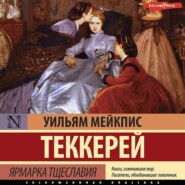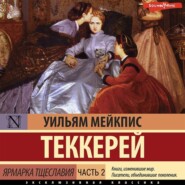По всем вопросам обращайтесь на: info@litportal.ru
(©) 2003-2024.
✖
Vanity Fair
Настройки чтения
Размер шрифта
Высота строк
Поля
It was he who taught the butler to say, “My lady is served,” and who insisted on handing her ladyship in to dinner. He seldom spoke to her, but when he did it was with the most powerful respect; and he never let her quit the apartment without rising in the most stately manner to open the door, and making an elegant bow at her egress.
At Eton he was called Miss Crawley; and there, I am sorry to say, his younger brother Rawdon used to lick him violently. But though his parts were not brilliant, he made up for his lack of talent by meritorious industry, and was never known, during eight years at school, to be subject to that punishment which it is generally thought none but a cherub can escape.
At college his career was of course highly creditable. And here he prepared himself for public life, into which he was to be introduced by the patronage of his grandfather, Lord Binkie, by studying the ancient and modern orators with great assiduity, and by speaking unceasingly at the debating societies. But though he had a fine flux of words, and delivered his little voice with great pomposity and pleasure to himself, and never advanced any sentiment or opinion which was not perfectly trite and stale, and supported by a Latin quotation; yet he failed somehow, in spite of a mediocrity which ought to have insured any man a success. He did not even get the prize poem, which all his friends said he was sure of.
After leaving college he became Private Secretary to Lord Binkie, and was then appointed Attaché to the Legation at Pumpernickel, which post he filled with perfect honour, and brought home despatches, consisting of Strasburg pie, to the Foreign Minister of the day. After remaining ten years Attaché (several years after the lamented Lord Binkie’s demise), and finding the advancement slow, he at length gave up the diplomatic service in some disgust, and began to turn country gentleman.
He wrote a pamphlet on Malt on returning to England (for he was an ambitious man, and always liked to be before the public), and took a strong part in the Negro Emancipation question. Then he became a friend of Mr. Wilberforce’s, whose politics he admired, and had that famous correspondence with the Reverend Silas Hornblower, on the Ashantee Mission. He was in London, if not for the Parliament session, at least in May, for the religious meetings. In the country he was a magistrate, and an active visitor and speaker among those destitute of religious instruction. He was said to be paying his addresses to Lady Jane Sheepshanks, Lord Southdown’s third daughter, and whose sister, Lady Emily, wrote those sweet tracts, “The Sailor’s True Binnacle,” and “The Applewoman of Finchley Common.”
Miss Sharp’s accounts of his employment at Queen’s Crawley were not caricatures. He subjected the servants there to the devotional exercises before mentioned, in which (and so much the better) he brought his father to join. He patronised an Independent meeting-house in Crawley parish, much to the indignation of his uncle the Rector, and to the consequent delight of Sir Pitt, who was induced to go himself once or twice, which occasioned some violent sermons at Crawley parish church, directed point-blank at the Baronet’s old Gothic pew there. Honest Sir Pitt, however, did not feel the force of these discourses, as he always took his nap during sermon-time.
Mr. Crawley was very earnest, for the good of the nation and of the Christian world, that the old gentleman should yield him up his place in Parliament; but this the elder constantly refused to do. Both were of course too prudent to give up the fifteen hundred a year which was brought in by the second seat (at this period filled by Mr. Quadroon, with carte-blanche on the Slave question); indeed the family estate was much embarrassed, and the income drawn from the borough was of great use to the house of Queen’s Crawley.
It had never recovered the heavy fine imposed upon Walpole Crawley, first baronet, for peculation in the Tape and Sealing-Wax Office. Sir Walpole was a jolly fellow, eager to seize and to spend money (“alieni appetens, sui profusus,” as Mr. Crawley would remark with a sigh), and in his day beloved by all the county for the constant drunkenness and hospitality which was maintained at Queen’s Crawley. The cellars were filled with Burgundy then, the kennels with hounds, and the stables with gallant hunters; now, such horses as Queen’s Crawley possessed went to plough, or ran in the Trafalgar Coach; and it was with a team of these very horses, on an off-day, that Miss Sharp was brought to the Hall; for boor as he was, Sir Pitt was a stickler for his dignity while at home, and seldom drove out but with four horses, and though he dined off boiled mutton, had always three footmen to serve it.
If mere parsimony could have made a man rich, Sir Pitt Crawley might have become very wealthy—if he had been an attorney in a country town, with no capital but his brains, it is very possible that he would have turned them to good account, and might have achieved for himself a very considerable influence and competency. But he was unluckily endowed with a good name and a large though encumbered estate, both of which went rather to injure than to advance him. He had a taste for law, which cost him many thousands yearly; and being a great deal too clever to be robbed, as he said, by any single agent, allowed his affairs to be mismanaged by a dozen, whom he all equally mistrusted. He was such a sharp landlord, that he could hardly find any but bankrupt tenants; and such a close farmer, as to grudge almost the seed to the ground, whereupon revengeful Nature grudged him the crops which she granted to more liberal husbandmen. He speculated in every possible way; he worked mines; bought canal-shares; horsed coaches; took government contracts, and was the busiest man and magistrate of his county. As he would not pay honest agents at his granite quarry, he had the satisfaction of finding that four overseers ran away, and took fortunes with them to America. For want of proper precautions, his coal-mines filled with water: the government flung his contract of damaged beef upon his hands: and for his coach-horses, every mail proprietor in the kingdom knew that he lost more horses than any man in the country, from underfeeding and buying cheap. In disposition he was sociable, and far from being proud; nay, he rather preferred the society of a farmer or a horse-dealer to that of a gentleman, like my lord, his son; he was fond of drink, of swearing, of joking with the farmers’ daughters: he was never known to give away a shilling or to do a good action, but was of a pleasant, sly, laughing mood, and would cut his joke and drink his glass with a tenant and sell him up the next day; or have his laugh with the poacher he was transporting with equal good humour. His politeness for the fair sex has already been hinted at by Miss Rebecca Sharp—in a word, the whole baronetage, peerage, commonage of England, did not contain a more cunning, mean, selfish, foolish, disreputable old man. That blood-red hand of Sir Pitt Crawley’s would be in anybody’s pocket except his own; and it is with grief and pain, that, as admirers of the British aristocracy, we find ourselves obliged to admit the existence of so many ill qualities in a person whose name is in Debrett.
One great cause why Mr. Crawley had such a hold over the affections of his father, resulted from money arrangements. The Baronet owed his son a sum of money out of the jointure of his mother, which he did not find it convenient to pay; indeed he had an almost invincible repugnance to paying anybody, and could only be brought by force to discharge his debts. Miss Sharp calculated (for she became, as we shall hear speedily, inducted into most of the secrets of the family) that the mere payment of his creditors cost the honourable Baronet several hundreds yearly; but this was a delight he could not forego; he had a savage pleasure in making the poor wretches wait, and in shifting from court to court and from term to term the period of satisfaction. What’s the good of being in Parliament, he said, if you must pay your debts? Hence, indeed, his position as a senator was not a little useful to him.
Vanity Fair—Vanity Fair! Here was a man, who could not spell, and did not care to read—who had the habits and the cunning of a boor: whose aim in life was pettifogging: who never had a taste, or emotion, or enjoyment, but what was sordid and foul: and yet he had rank, and honours, and power, somehow: and was a dignitary of the land, and a pillar of the state. He was high sheriff, and rode in a golden coach. Great ministers and statesmen courted him; and in Vanity Fair he had a higher place than the most brilliant genius or spotless virtue.
Sir Pitt had an unmarried half-sister who inherited her mother’s large fortune, and though the Baronet proposed to borrow this money of her on mortgage, Miss Crawley declined the offer, and preferred the security of the funds. She had signified, however, her intention of leaving her inheritance between Sir Pitt’s second son and the family at the Rectory and had once or twice paid the debts of Rawdon Crawley in his career at college and in the army. Miss Crawley was, in consequence, an object of great respect when she came to Queen’s Crawley, for she had a balance at her banker’s which would have made her beloved anywhere.
What a dignity it gives an old lady, that balance at the banker’s! How tenderly we look at her faults if she is a relative (and may every reader have a score of such), what a kind good-natured old creature we find her! How the junior partner of Hobbs and Dobbs leads her smiling to the carriage with the lozenge upon it, and the fat wheezy coachman! How, when she comes to pay us a visit, we generally find an opportunity to let our friends know her station in the world! We say (and with perfect truth) I wish I had Miss MacWhirter’s signature to a cheque for five thousand pounds. She wouldn’t miss it, says your wife. She is my aunt, say you, in an easy careless way, when your friend asks if Miss MacWhirter is any relative. Your wife is perpetually sending her little testimonies of affection, your little girls work endless worsted baskets, cushions, and footstools for her. What a good fire there is in her room when she comes to pay you a visit, although your wife laces her stays without one! The house during her stay assumes a festive, neat, warm, jovial, snug appearance not visible at other seasons. You yourself, dear sir, forget to go to sleep after dinner, and find yourself all of a sudden (though you invariably lose) very fond of a rubber. What good dinners you have—game every day, Malmsey-Madeira, and no end of fish from London. Even the servants in the kitchen share in the general prosperity; and, somehow, during the stay of Miss MacWhirter’s fat coachman, the beer is grown much stronger, and the consumption of tea and sugar in the nursery (where her maid takes her meals) is not regarded in the least. Is it so, or is it not so? I appeal to the middle classes. Ah, gracious powers! I wish you would send me an old aunt—a maiden aunt—an aunt with a lozenge on her carriage, and a front of light coffee-coloured hair—how my children should work workbags for her, and my Julia and I would make her comfortable! Sweet—sweet vision! Foolish—foolish dream!
CHAPTER 10 Miss Sharp begins to make friends (#ulink_a6ea2bdd-cf39-5941-90e2-1b5219c65886)
And now, being received as a member of the amiable family whose portraits we have sketched in the foregoing pages, it became naturally Rebecca’s duty to make herself, as she said, agreeable to her benefactors, and to gain their confidence to the utmost of her power. Who can but admire this quality of gratitude in an unprotected orphan; and, if there entered some degree of selfishness into her calculations, who can say but that her prudence was perfectly justifiable? “I am alone in the world,” said the friendless girl. “I have nothing to look for but what my own labour can bring me; and while that little pink-faced chit Amelia, with not half my sense, has ten thousand pounds and an establishment secure, poor Rebecca (and my figure is far better than hers) has only herself and her own wits to trust to. Well, let us see if my wits cannot provide me with an honourable maintenance, and if some day or the other I cannot show Miss Amelia my real superiority over her. Not that I dislike poor Amelia: who can dislike such a harmless, good-natured creature?—only it will be a fine day when I can take my place above her in the world, as why, indeed, should I not?” Thus it was that our little romantic friend formed visions of the future for herself, nor must we be scandalised that, in all her castles in the air, a husband was the principal inhabitant. Of what else have young ladies to think, but husbands? Of what else do their dear mammas think? “I must be my own mamma,” said Rebecca; not without a tingling consciousness of defeat, as she thought over her little misadventure with Jos Sedley.
So she wisely determined to render her position with the Queen’s Crawley family comfortable and secure, and to this end resolved to make friends of every one around who could at all interfere with her comfort.
As my Lady Crawley was not one of these personages, and a woman, moreover, so indolent and void of character as not to be of the least consequence in her own house, Rebecca soon found that it was not at all necessary to cultivate her good will—indeed, impossible to gain it. She used to talk to her pupils about their “poor mamma”; and, though she treated that lady with every demonstration of cool respect, it was to the rest of the family that she wisely directed the chief part of her attentions.
With the young people, whose applause she thoroughly gained, her method was pretty simple. She did not pester their young brains with too much learning, but, on the contrary, let them have their own way in regard to educating themselves; for what instruction is more effectual than self-instruction? The eldest was rather fond of books, and as there was in the old library at Queen’s Crawley a considerable provision of works of light literature of the last century, both in the French and English languages (they had been purchased by the Secretary of the Tape and Sealing-Wax Office at the period of his disgrace), and as nobody ever troubled the bookshelves but herself, Rebecca was enabled agreeably, and, as it were, in playing, to impart a great deal of instruction to Miss Rose Crawley.
She and Miss Rose thus read together many delightful French and English works, among which may be mentioned those of the learned Dr. Smollett, of the ingenious Mr. Henry Fielding, of the graceful and fantastic Monsieur Crébillon the younger, whom our immortal poet Gray so much admired, and of the universal Monsieur de Voltaire. Once, when Mr. Crawley asked what the young people were reading, the governess replied “Smollett.” “Oh, Smollett,” said Mr. Crawley, quite satisfied. “His history is more dull, but by no means so dangerous as that of Mr. Hume. It is history you are reading?” “Yes,” said Miss Rose; without, however, adding that it was the history of Mr. Humphrey Clinker. On another occasion he was rather scandalised at finding his sister with a book of French plays; but as the governess remarked that it was for the purpose of acquiring the French idiom in conversation, he was fain to be content. Mr. Crawley, as a diplomatist, was exceedingly proud of his own skill in speaking the French language (for he was of the world still), and not a little pleased with the compliments which the governess continually paid him upon his proficiency.
Miss Violet’s tastes were, on the contrary, more rude and boisterous than those of her sister. She knew the sequestered spots where the hens laid their eggs. She could climb a tree to rob the nests of the feathered songsters of their speckled spoils. And her pleasure was to ride the young colts, and to scour the plains like Camilla. She was the favourite of her father and of the stablemen. She was the darling, and withal the terror of the cook; for she discovered the haunts of the jam-pots, and would attack them when they were within her reach. She and her sister were engaged in constant battles. Any of which peccadilloes, if Miss Sharp discovered, she did not tell them to Lady Crawley, who would have told them to the father, or worse, to Mr. Crawley; but promised not to tell if Miss Violet would be a good girl and love her governess.
With Mr. Crawley Miss Sharp was respectful and obedient. She used to consult him on passages of French which she could not understand, though her mother was a Frenchwoman, and which he would construe to her satisfaction: and, besides giving her his aid in profane literature, he was kind enough to select for her books of a more serious tendency, and address to her much of his conversation. She admired, beyond measure, his speech at the Quashimaboo-Aid Society; took an interest in his pamphlet on Malt: was often affected, even to tears, by his discourses of an evening, and would say—“Oh, thank you, sir,” with a sigh, and a look up to heaven, that made him occasionally condescend to shake hands with her. “Blood is everything, after all,” would that aristocratic religionist say. “How Miss Sharp is awakened by my words, when not one of the people here is touched. I am too fine for them—too delicate. I must familiarise my style—but she understands it. Her mother was a Montmorency.”
Indeed it was from this famous family, as it appears, that Miss Sharp, by the mother’s side, was descended. Of course she did not say that her mother had been on the stage; it would have shocked Mr. Crawley’s religious scruples. How many noble émigrées had this horrid revolution plunged into poverty! She had several stories about her ancestors ere she had been many months in the house; some of which Mr. Crawley happened to find in D’Hozier’s dictionary, which was in the library, and which strengthened his belief in their truth, and in the high breeding of Rebecca. Are we to suppose from this curiosity and prying into dictionaries, could our heroine suppose, that Mr. Crawley was interested in her?—No, only in a friendly way. Have we not stated that he was attached to Lady Jane Sheepshanks?
He took Rebecca to task once or twice about the propriety of playing at backgammon with Sir Pitt, saying that it was a godless amusement, and that she would be much better engaged in reading “Thrump’s Legacy,” or “The Blind Washerwoman of Moorfields,” or any work of a more serious nature; but Miss Sharp said her dear mother used often to play the same game with the old Count de Trictrac and the venerable Abbé du Cornet, and so found an excuse for this and other worldly amusements.
But it was not only by playing backgammon with the Baronet, that the little governess rendered herself agreeable to her employer. She found many different ways of being useful to him. She read over, with indefatigable patience, all those law papers, with which, before she came to Queen’s Crawley, he had promised to entertain her. She volunteered to copy many of his letters, and adroitly altered the spelling of them so as to suit the usages of the present day. She became interested in everything appertaining to the estate, to the farm, the park, the garden, and the stables; and so delightful a companion was she, that the Baronet would seldom take his after-breakfast walk without her (and the children of course), when she would give her advice as to the trees which were to be lopped in the shrubberies, the garden-beds to be dug up, the crops which were to be cut, the horses which were to go to cart or plough. Before she had been a year at Queen’s Crawley she had quite won the Baronet’s confidence; and the conversation at the dinner-table, which before used to be held between him and Mr. Horrocks the butler, was now almost exclusively between Sir Pitt and Miss Sharp. She was almost mistress of the house when Mr. Crawley was absent, but conducted herself in her new and exalted situation with such circumspection and modesty as not to offend the authorities of the kitchen and stable, among whom her behaviour was always exceedingly modest and affable. She was quite a different person from the haughty, shy, dissatisfied little girl whom we have known previously, and this change of temper proved great prudence, a sincere desire of amendment, or at any rate great moral courage on her part. Whether it was the heart which dictated this new system of complaisance and humility adopted by our Rebecca, is to be proved by her after history. A system of hypocrisy, which lasts through whole years, is one seldom satisfactorily practised by a person of one-and-twenty; however, our readers will recollect that, though young in years, our heroine was old in life and experience, and we have written to no purpose if they have not discovered that she was a very clever woman.
The elder and younger son of the house of Crawley were, like the gentleman and lady in the weather-box, never at home together—they hated each other cordially: indeed, Rawdon Crawley, the dragoon, had a great contempt for the establishment altogether, and seldom came thither except when his aunt paid her annual visit.
The great good quality of this old lady has been mentioned. She possessed seventy thousand pounds, and had almost adopted Rawdon. She disliked her elder nephew exceedingly, and despised him as a milksop. In return he did not hesitate to state that her soul was irretrievably lost, and was of opinion that his brother’s chance in the next world was not a whit better. “She is a godless woman of the world,” would Mr. Crawley say; “She lives with atheists and Frenchmen. My mind shudders when I think of her awful, awful situation, and that, near as she is to the grave, she should be so given up to vanity, licentiousness, profaneness, and folly.” In fact, the old lady declined altogether to hear his hour’s lecture of an evening; and when she came to Queen’s Crawley alone, he was obliged to pretermit his usual devotional exercises.
“Shut up your sarmons, Pitt, when Miss Crawley comes down,” said his father; “she has written to say that she won’t stand the preachifying.”
“O sir! consider the servants.”
“The servants be hanged!” said Sir Pitt; and his son thought even worse would happen were they deprived of the benefit of his instruction.
“Why, hang it, Pitt!” said the father to his remonstrance. “You wouldn’t be such a flat as to let three thousand a year go out of the family?”
“What is money compared to our souls, sir?” continued Mr. Crawley.
“You mean that the old lady won’t leave the money to you?”—and who knows but it was Mr. Crawley’s meaning?
Old Miss Crawley was certainly one of the reprobate. She had a snug little house in Park Lane, and, as she ate and drank a great deal too much during the season in London, she went to Harrowgate or Cheltenham for the summer. She was the most hospitable and jovial of old vestals, and had been a beauty in her day, she said. (All old women were beauties once, we very well know.) She was a bel esprit, and a dreadful Radical for those days. She had been in France (where St. Just, they say, inspired her with an unfortunate passion), and loved, ever after, French novels, French cookery, and French wines. She read Voltaire, and had Rousseau by heart; talked very lightly about divorce, and most energetically of the rights of women. She had pictures of Mr. Fox in every room in the house: when that statesman was in opposition, I am not sure that she had not flung a main with him; and when he came into office, she took great credit for bringing over to him Sir Pitt and his colleague for Queen’s Crawley, although Sir Pitt would have come over himself, without any trouble on the honest lady’s part. It is needless to say that Sir Pitt was brought to change his views after the death of the great Whig statesman.
This worthy old lady took a fancy to Rawdon Crawley when a boy, sent him to Cambridge (in opposition to his brother at Oxford), and, when the young man was requested by the authorities of the first-named University to quit after a residence of two years, she bought him his commission in the Life Guards Green.
A perfect and celebrated “blood” or dandy about town, was this young officer. Boxing, rat-hunting, the fives’ court, and four-in-hand driving were then the fashion of our British aristocracy; and he was an adept in all these noble sciences. And though he belonged to the household troops, who, as it was their duty to rally round the Prince Regent, had not shown their valour in foreign service yet, Rawdon Crawley had already (àpropos of play, of which he was immoderately fond) fought three bloody duels, in which he gave ample proofs of his contempt for death.
“And for what follows after death,” would Mr. Crawley observe, throwing his gooseberry-coloured eyes up to the ceiling. He was always thinking of his brother’s soul, or of the souls of those who differed with him in opinion: it is a sort of comfort which many of the serious give themselves.
Silly, romantic Miss Crawley, far from being horrified at the courage of her favourite, always used to pay his debts after his duels; and would not listen to a word that was whispered against his morality. “He will sow his wild oats,’ she would say, “and is worth far more than that puling hypocrite of a brother of his.”
CHAPTER 11 Arcadian simplicity (#ulink_034f5570-d5fe-549c-9677-8a68d276982a)
Besides these honest folks at the Hall (whose simplicity and sweet rural purity surely show the advantage of a country life over a town one), we must introduce the reader to their relatives and neighbours at the Rectory, Bute Crawley and his wife.
The Reverend Bute Crawley was a tall, stately, jolly, shovelhatted man, far more popular in his county than the Baronet his brother. At college he pulled stroke-oar in the Christchurch boat, and had thrashed all the best bruisers of the “town.” He carried his taste for boxing and athletic exercises into private life; there was not a fight within twenty miles at which he was not present, nor a race, nor a coursing match, nor a regatta, nor a ball, nor an election, nor a visitation dinner, nor indeed a good dinner in the whole county, but he found means to attend it. You might see his bay-mare and gig-lamps a score of miles away from his Rectory House, whenever there was any dinner-party at Fuddleston, or at Roxby, or at Wapshot Hall, or at the great lords of the county, with all of whom he was intimate. He had a fine voice; sang “A southerly wind and a cloudy sky”; and gave the “whoop” in chorus with general applause. He rode to hounds in a pepper-and-salt frock, and was one of the best fishermen in the county.
Mrs. Crawley, the Rector’s wife, was a smart little body, who wrote this worthy divine’s sermons. Being of a domestic turn, and keeping the house a great deal with her daughters, she ruled absolutely within the Rectory, wisely giving her husband full liberty without. He was welcome to come and go, and dine abroad as many days as his fancy dictated, for Mrs. Crawley was a saving woman and knew the price of port wine. Ever since Mrs. Bute carried off the young Rector of Queen’s Crawley (she was of a good family, daughter of the late Lieut.-Colonel Hector MacTavish, and she and her mother played for Bute and won him at Harrowgate), she had been a prudent and thrifty wife to him. In spite of her care, however, he was always in debt. It took him at least ten years to pay off his college bills contracted during his father’s lifetime. In the year 179—, when he was just clear of these encumbrances, he gave the odds of 100 to 1 (in twenties) against Kangaroo, who won the Derby. The Rector was obliged to take up the money at a ruinous interest, and had been struggling ever since. His sister helped him with a hundred now and then, but of course his great hope was in her death—when “hang it” (as he would say), “Matilda must leave me half her money.”
So that the Baronet and his brother had every reason which two brothers possibly can have for being by the ears. Sir Pitt had had the better of Bute in innumerable family transactions. Young Pitt not only did not hunt, but set up a meeting-house under his uncle’s very nose. Rawdon, it was known, was to come in for the bulk of Miss Crawley’s property. These money transactions—these speculations in life and death—these silent battles for reversionary spoil—make brothers very loving towards each other in Vanity Fair. I, for my part, have known a five-pound note to interpose and knock up a half-century’s attachment between two brethren; and can’t but admire, as I think what a fine and durable thing Love is among worldly people.
It cannot be supposed that the arrival of such a personage as Rebecca at Queen’s Crawley, and her gradual establishment in the good graces of all people there, could be unremarked by Mrs. Bute Crawley. Mrs. Bute, who knew how many days the sirloin of beef lasted at the Hall; how much linen was got ready at the great wash; how many peaches were on the south wall; how many doses her ladyship took when she was ill—for such points are matters of intense interest to certain persons in the country—Mrs. Bute, I say, could not pass over the Hall governess without making every inquiry respecting her history and character. There was always the best understanding between the servants at the Rectory and the Hall. There was always a good glass of ale in the kitchen of the former place for the Hall people, whose ordinary drink was very small—and, indeed, the Rector’s lady knew exactly how much malt went to every barrel of Hall beer—ties of relationship existed between the Hall and Rectory domestics, as between their masters; and through these channels each family was perfectly well acquainted with the doings of the other. That, by the way, may be set down as a general remark. When you and your brother are friends, his doings are indifferent to you. When you have quarrelled, all his outgoings and incomings you know, as if you were his spy.
Very soon then after her arrival, Rebecca began to take a regular place in Mrs. Crawley’s bulletin from the Hall. It was to this effect:—“The black porker’s killed—weighed x stone—salted the sides—pig’s pudding and leg of pork for dinner. Mr. Cramp from Mudbury, over with Sir Pitt about putting John Blackmore in gaol—Mr. Pitt at meeting (with all the names of the people who attended)—my lady as usual—the young ladies with the governess.”
Then the report would come—The new governess be a rare manager—Sir Pitt be very sweet on her—Mr. Crawley too—He be reading tracts to her—“What an abandoned wretch!” said little, eager, active, black-faced Mrs. Bute Crawley.
Finally, the reports were that the governess had “come round” everybody, wrote Sir Pitt’s letters, did his business, managed his accounts—had the upper hand of the whole house, my lady, Mr. Crawley, the girls and all—at which Mrs. Crawley declared she was an artful hussey, and had some dreadful designs in view. Thus the doings at the Hall were the great food for conversation at the Rectory, and Mrs. Bute’s bright eyes spied out everything that took place in the enemy’s camp—everything and a great deal besides.
“Mrs. Bute Crawley to Miss Pinkerton, The Mall, Chiswick.
“Rectory, Queen’s Crawley, December—
“My Dear Madam,—Although it is so many years since I profited by your delightful and invaluable instructions, yet I have ever retained the fondest and most reverential regard for Miss Pinkerton, and dear Chiswick. I hope your health is good. The world and the cause of education cannot afford to lose Miss Pinkerton for many many years. When my friend, Lady Fuddleston, mentioned that her dear girls required an instructress (I am too poor to engage a governess for mine, but was I not educated at Chiswick?)—‘Who,’ I exclaimed, ‘can we consult but the excellent, the incomparable Miss Pinkerton?’ In a word, have you, dear madam, any ladies on your list, whose services might be made available to my kind friend and neighbour? I assure you she will take no governess but of your choosing.
“My dear husband is pleased to say that he likes everything which comes from Miss Pinkerton’s school. How I wish I could present him and my beloved girls to the friend of my youth, and the admired of the great lexicographer of our country! If you ever travel into Hampshire, Mr. Crawley begs me to say, he hopes you will adorn our rural rectory with your presence. ’Tis the humble but happy home of

















